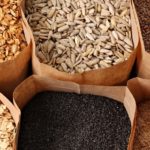Monosodium glutamate (MSG) has long had a prominent spot on the list of dietary no-no’s, at least among the health conscious. By definition, MSG is simply processed free glutamic acid combined with sodium to form monosodium glutamate. But it is the glutamic acid component of MSG that is the neurotransmitter that causes nerves to fire, and that is what creates problems for many who consume it. The bottom line is that MSG-sensitivity is, in fact, sensitivity to free glutamic acid — glutamic acid that is not bound up in protein. All protein (dairy, soy, rice protein, etc.) contains glutamic acid as a constituent amino acid, but as such, it is bound-up in the protein. Only if that glutamic acid becomes freed from its protein source before it is eaten, do people have MSG-sensitivity reactions.
For up to 30 percent of the population, consuming just a little of the flavor enhancer can lead to migraines, faintness, nausea, diarrhea, palpitations, and a feeling that evokes flying insects tickling the inside of the skull. But the discomfort triggered by ingestion pales next to the potential serious conditions that MSG can trigger, particularly in children: asthma, brain damage including lesions of the hypothalamus, neuroendocrine disorders, seizures, liver damage, psychiatric conditions, and retinal deterioration.
And now you can add one more hazard to the already alarming list of MSG side effects: obesity. It’s not exactly news that MSG can lead to weight gain. In fact, way back in 1968, Dr. John W. Olney, M.D., of Washington University Medical School, found that rats fed MSG became grotesquely obese. Since then, 151 studies have duplicated his results, using a variety of lab animals. But only this year has a study come out showing a clear link between MSG consumption and obesity in humans.
The research, out of the University of North Carolina, followed 750 men and women aged 40 to 59 living in rural China. Three times as many subjects in the group that consumed the highest amounts of MSG were overweight compared to those who abstained from MSG. The researchers controlled for physical activity, total caloric intake, and other variables, but still, the MSG aficionados put on the most weight by far.
MSG is considered an “exciteotoxin,” meaning that it stimulates neurotransmitters in the brain which in turn “excite” nerves related to taste, making food taste better. In other words, it actually adds no flavor to your food; the enhanced flavor literally is “all in your head.” Now, the reason scientists have given in the past for MSG contributing to weight gain is that the nerves excited by MSG don’t only affect your taste buds — they also give you a speedy, caffeinated feeling and simultaneously damage the appetite regulation center in your hypothalamus. The impaired hypothalamus then fails to send you a cue to stop eating even if you’re full, and so you eat like a hippo.
It makes sense that if MSG leads to unregulated appetite, those who consume it would gain weight; that’s how scientists have explained the MSG-related weight gain in lab animals. But in the recent study, the researchers controlled for caloric intake and still MSG led to significant weight gain — so clearly, something independent of nerve-induced gluttony is going on. The scientists postulate that in addition to stimulating appetite, MSG alters fat metabolism, plus, it seems to impair the hormones that control weight gain.
If only you could just scratch MSG from your diet, it would be an easy fix. But MSG masquerades as many other innocuous sounding ingredients that you’ll find in a large proportion of food items. For instance, all of these additives always contain MSG (or simply are MSG in disguise): yeast extract, hydrolyzed protein, calcium caseinate, sodium caseinate, textured protein (including TVP), corn oil, and gelatin. Other additives that may contain MSG include corn starch, soy sauce, seasonings, carageenan, maltodextrin, rice syrup, whey protein, soy protein isolate, malt flavoring, stock, and many others (see MSG list).
Note: It has been claimed on a number of internet sites that all extracted proteins such as soy, pea, and rice proteins are hydrolyzed and therefore contain free glutamic acid. Pea protein in particular seems to be getting a bad rap. But this is a gross generalization and simply not correct. Free glutamic acid is only created if the process used for separating the protein from its companion fiber and carbohydrates denatures the protein — that is, if the bonds that hold the amino acids together are broken. This will invariably happen if the process used involves strong acids or bases. But in your better grade pea and rice proteins, that is not the case. Low temperature and chemical free processing prevent the denaturing of amino acids. The integrity of the protein is maintained; no free glutamic acid is created, and the end product is 80-90% pure, hypoallergenic, easily digested protein.
Oh, and shopping at the health food store doesn’t guarantee that you’ll avoid MSG. Check labels and you’ll be shocked to discover that, in fact, even many organic prepared foods contain either MSG, or free-form glutamic acid. For instance, Bragg’s Liquid Amino Acids are a rich source of free glutamic acid (hydrochloric acid is used in processing the liquid aminos). And many so-called “natural flavors” can include protein hydrolysates which can contain up to 20% MSG.
Lest you despair that you’ll never lose weight with MSG so omnipresent, here’s a bit of advice. Avoid prepared foods, rely on local organic produce to the extent possible, learn which MSG imposters masquerade as other ingredients and check labels, and take up text messaging. Yes, text messaging. An almost simultaneous study out of the University of North Carolina found that kids who text messaged had far more success dieting than did other children. In fact, the kids who reported in via text messaging twice daily on what they were eating were twice as likely to stick with their diets compared to kids who didn’t text. Now we just need to wait for the techies to come up with an alarm that sounds the MSG warning bell when you text the name of a food containing the stuff.
:hc












Bull. MSG does not cross the brain-blood barrier; the gutamate in MSG is handled exactly as is natural glutamate by the body. All of the ‘effects’ of MSG that you cite have been debunked. MSG is now considered safe by virtually every major certifier of foods (FDA etc.).
Experimental evidence does suggest that hi levels of MSG cause problems in young (prenatal) rats. However, there is absolutely no evidence that similar effects occur in humans.
when i eat pho i have a major
when i eat pho i have a major physical reaction almost immediately and i swear on my life that in only one sitting, i gained a noticable amount of weight around my knees and face. This was NOT just water retention. It has been over a week and even though I only eat about a meal a day and workout, I still am not back to normal.
I also experienced extreme pressure on both sides of my face and felt like I’d been shot with one of those darts they shoot wild animals with to make them go to sleep.
will never touch the stuff again.
Msg (monosodium glutamate) is
Msg (monosodium glutamate) is a neurotoxin and a non essential amino acid. This should be banned from any and all food products. Not only does it affect a persons health with varying symptoms from headaches, water retention and seizures with irrevirsable brain damage.. Its simply rediculuos this is allowed in US health markets. It can also be stored in fat, nerve and muscle cells. Whats worse is its very difficult to avoid because it can be disguised under 20 different names. If theres nothing to hide then why do they try so hard.. Then people in the US wonder why they have higher obesity and cancer rates.. This is rediculous and should be banned, no doubt..
Whenever I consume foods containing MSG I first become bloated in the abdominal area and then begin to get sharp chest pains similar to a heart attack. This can last for several hours. My daughter reacts similarly. No-one can tell me MSG is a safe additive. Two friends of mine get headaches — one, migraines.
MSG should be BANNED from ALL
MSG should be BANNED from ALL foods. There is no beneficial properties associated to it. I too, suffer when I ingest foods with this poison. Whenever I consume foods containing MSG I first become bloated in the abdominal area and then begin to get sharp chest pains similar to a heart attack. This can last for several hours.
Msg is a neurotoxin and a non
Msg is a neurotoxin and a non essential amino acid. This should be banned from any and all food products. Not only does it affect a persons health with varying symptoms from headaches, water retention and seizures with irrevirsable brain damage.. Its simply rediculuos this is allowed in US health markets. It can also be stored in fat, nerve and muscle cells. Whats worse is its very difficult to avoid because it can be disguised under 20 different names. If theres nothing to hide then why do they try so hard.. Then people in the US wonder why they have higher obesity and cancer rates.. This is rediculous and should be banned, no doubt..
Hi Baseline,
Hi Baseline,
I’m sorry, but I didn’t know where else to post this question…
I had always thought that gelatine was something to avoid, but recently I read that it may actually be useful for connective tissue as that is what it’s made from. What is your opinion on this?
Specifically I was wondering in regard to jelly type sweets (or ‘candy’ as it’s known in the States). I admit that although I’m fairly health conscious I’ve always liked such sweets 🙂
I suspect the answer is ‘well, it depends…’, and of course there’s the problem of the other ingredients that are usually used with such sweets.
Still, your help would be much appreciated.
Yes, gelatin can help with
Yes, gelatin can help with connective tissue, but It’s not the gelatin you’re after, but the collagen contained in the gelatin. And when it comes to collagen for joints, Jon Barron tends to favor undenatured chicken collagen as the better choice. https://jonbarron.org/anti-aging/five-pronged-approach-chronic-joint-pain-and-inflammation
If you decide to opt for gelatin, though, make sure it’s organic.
Many thanks Baseline 🙂
Many thanks Baseline 🙂
thank you for sharing with us
thank you for sharing with us this article